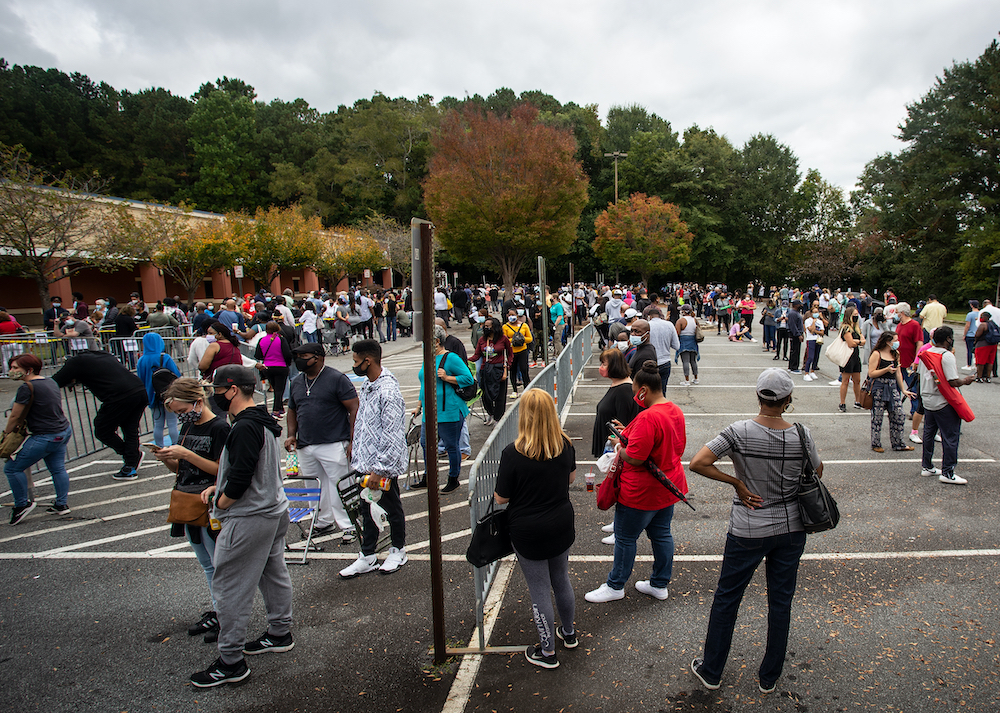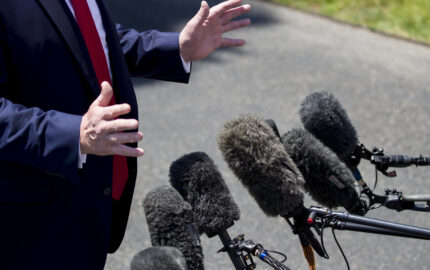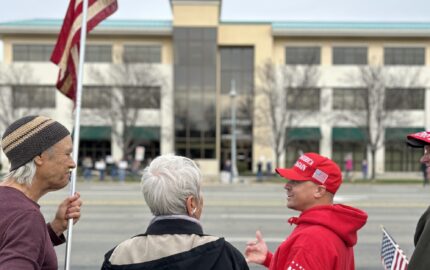I lead election coverage for The Atlanta Journal-Constitution, a mid-sized regional newspaper in Georgia. Our state, as you have probably heard, has become a bona fide battleground. The evidence is everywhere — in polling, candidate and surrogate visits, the crush of TV ads and mailers, and the many conversations we have with voters.
We are operating in a fiercely divided state, during a pandemic, at a time of shrinking resources, declining trust in news, and sometimes shocking disagreements over basic facts. It’s the most challenging election environment I’ve seen in my more than 20 years at the AJC.
I have to start by acknowledging that I am in a better position than many of my peers across the country. I work for a family-owned newspaper that still invests in robust coverage of state government and politics. We have maintained a decent-sized team of talented and hard-working journalists who have done astonishing work in challenging times. And like our colleagues at regional newspapers everywhere, we have learned to be nimble, shifting resources to cover the big stories, even if it leaves us a little exposed elsewhere (which it always does).
Related Reading
With mis- and disinformation campaigns heating up, a vacancy on the supreme Court, and a President who refuses to commit to accepting the results, the 2020 election arrives at a period of extraordinary uncertainty and tension. Nieman Reports and Nieman Lab are publishing a collection of stories exploring how newsrooms are covering this intensely contested vote and its aftermath.
High Voter Turnout? Result Delays? What to Expect from Cable News on Election Night
By Celeste Katz Marston
The Miami Herald: Covering the 2020 Election — and Remembering the 2000 Recount
By Amy Driscoll, Nieman Reports
The election could be contested and last for weeks after Nov. 3. Here’s what experts think journalists should know.
By Sarah Scire, Nieman Lab
And this election is a big, complicated and constantly changing story.
We are covering two U.S. Senate races, competitive congressional races, a battle for control of the state Legislature, an election system still reeling from a disastrous primary, and lingering questions about voting rights — all against the backdrop of a presidential race that has permeated absolutely everything and a pandemic that adds risk to the act of reporting.
It’s exhausting and fascinating — the story of our lifetimes.
Amid all this tumult, we know who we are and where our responsibilities lie. Our readers are the people who live, work, and vote in this deeply divided state. Our job is to watch out for them, to hold government and officials accountable, and to provide them with the information they need to participate in our democracy.
That may sound simplistic, but it’s also clarifying.
What does it look like? It’s deep investigations into voting rights and SEO-friendly explainers on how to vote by mail. It’s investigating candidates’ records, and it’s telling the story of this evolving state.
We’ve spent a great deal of energy trying to figure out how to prepare voters for this election. How to make sure they understand their options, are aware of the many changes associated with this election, and avoid potential pitfalls. We’ve focused on the state’s election system, which buckled during the primary under the weight of the pandemic and a host of state and local failures. We’ve emphasized the likelihood that outcomes may not be known for days or weeks as the work of counting what is expected to be a record number of votes continues. We are trying to “flood the zone” with information that is true and useful, and to monitor and get ahead of reports that are false, without amplifying bad information. When falsehoods threaten to sow confusion among Georgia voters, we call them out, no matter the source.
It’s a challenging task made even more difficult by a hyper-partisan environment. Polling and our reporting show that Georgia is as divided as a state can get. And that is reflected in the suspicion we hear from some readers. But reporting what is true is not a partisan act, no matter what anyone says. It’s our responsibility.
We still get calls and emails from folks who see us as the “liberal media” — or worse. And we are hearing more from readers who dismiss us as the “establishment” press. We listen and do our best to respond sincerely and politely. We believe that our best hope of building trust is to explain how and why we do what we do, and to remind readers that our journalists are part of the fabric of their communities, too.
Is it enough?
I ask myself that question every day. Along with what are we missing, what more could we do? And, damn, can it get any crazier? (The answer to that one appears always to be, yes.)
The pace grows more frenetic as we get closer to November 3. It’s stressful, but familiar. We know how to manage the work. The uncertainty is a different story.
We don’t know what November 3 will look like, or the days after, for that matter. No one does. So, we lay the groundwork on how votes will be counted and ready ourselves to counter premature claims of victory and false reports about the process. All while reporting whether the system performed as it should and investigating the inevitable disputes over ballots.
The one thing we can count on is that no matter what happens, it won’t be over for us next month. A January runoff is all but certain in at least one of our two Senate races and the need to watch out for voters will continue.
Susan Potter is senior editor for state government and politics at The Atlanta Journal–Constitution.



